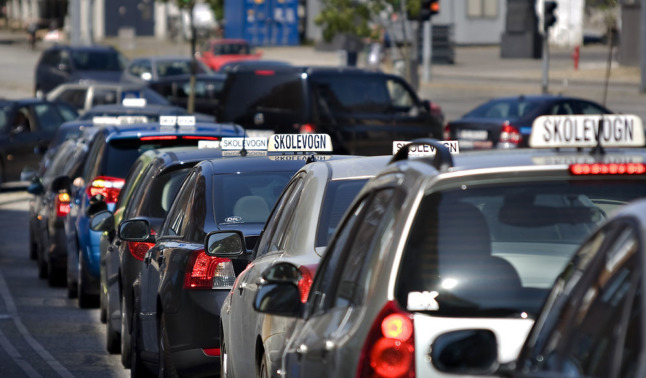Change for five million rail passengers: Bahncards 50 and 25 will be ten percent cheaper
The more than five million rail passengers in Germany should be happy about this news: The Bahncards 50 and 25, valid from February 1st, will in future cost 10 percent less.
READ ALSO: What you need to know about Deutsche Bahn’s new reduced ticket prices
The highest tax authorities of the federal states have agreed that the reduction in value-added tax for rail tickets will also apply to railcards. This means that:
- In future, a BahnCard 25 will cost €55.70 for 2nd class (instead of €62).
- The BahnCard 50 is now available for 2nd class from €229 (instead of €255).
After a short transition phase in January, it was already possible to buy the corresponding BahnCards at a reduced price. Those who recently ordered a Bahncard at the old VAT rate will receive a voucher for the difference.
“Deutsche Bahn will actively approach the affected customers; they do not need to take any action themselves”, the company said in a statement.

Hamburg state elections
On February 23rd, the people of the harbourside city-state will elect a new leadership. The state parliament is currently governed by a red-green coalition with the mayor Carola Veit (of the Social Democrats). There are 15 parties and voters' associations waiting to be elected.
Hamburg is the only federal state in which state parliament or citizenship elections will be held in 2020.
Bye, Bye WhatsApp (for some users)
The popular messaging service, which belongs to Facebook, has been the most-used chat service in Germany for years. Now, however, some users will have to say goodbye to WhatsApp from the beginning of February.
The reason: from then, the messenger can no longer be installed or used without restrictions on some smartphones with outdated Android and iOS operating systems.
The following two versions are affected: Android-Version 2.3.7 and all older models, and the iPhone iOS 8 and all older models.
READ ALSO: These are the essential smartphone apps for living in Germany
A leap of faith
If it seems like winter is dragging on for longer this year that’s because, well, it is. As occurs every four years, February 29th will make the month last a day longer.
That’s not such great news for workers in Germany who already have to contend with several public holidays that fall on a weekend this year. However, many economists are eagerly making predictions about the positive impact that an extra day of productivity will carry.
READ ALSO: What and when are Germany’s 2020 public holidays?
No more subscription traps
The Federal Network Agency wants to better protect mobile phone users from so-called subscription traps. Starting February 1st, mobile phone operators will therefore have to inform consumers more clearly if they are about to make a subscription purchase from a third party provider.
Up to now, simply pressing a button (even if inadvertently) has often been sufficient to order paid services, for example in games and apps.
In the future, so-called redirect procedures will ensure that users are redirected to a separate payment page where they must confirm the purchase again.
B-Day is finally coming
After a few years and a few false alarms, Britain is due to leave the EU on January 31st. Yet not much is due to change immediately. Rather, in a transition phase lasting until the end of the year, both sides want to negotiate an agreement and decide how exactly the new relations will look.
During this transition phase, European law will continue to apply to the UK, as well. At the same time, the British will remain part of the EU internal market and the EU customs union until the end of this period. However, as of February, the UK will lose its right of co-determination in the EU institutions.
READ ALSO: Can Brits still move to Germany after Brexit day?
 Germany, British and EU flags outside of Tegel Airport in Berlin in May 2019. Photo: DPA
Germany, British and EU flags outside of Tegel Airport in Berlin in May 2019. Photo: DPA
Health insurance companies increase data protection
As of February, the fax machine will become extinct – at least for the German health insurance companies.
A transitional phase will end on February 5th, when health insurance companies will no longer be allowed to inform patients, doctors, clinics or social insurance funds by fax or exchange data via this “short official channel”.
READ ALSO:
- How German health care is set to become more digital in 2020
- German health care: Everything that changes for patients in 2020
Communication should then only take place in person, by post or by telephone. Communication via e-mail is only possible if the data is sent with a “high level of protection” and “end-to-end encryption”.
Charging of e-cars will be more expensive for some drivers
Rapid charging station operator Ionity has introduced a new pricing model that is scheduled to come into effect on January 31st. As a result, electricity will become more expensive for all direct customers at one of the approximately 200 charging points currently available in Europe.
Previously, Ionity charged a flat rate of €8 per charge at its rapid charging points. In the future, the charging electricity price for direct customers without a customer card is to be 79 cents per kilowatt hour from February.



 Please whitelist us to continue reading.
Please whitelist us to continue reading.
Member comments